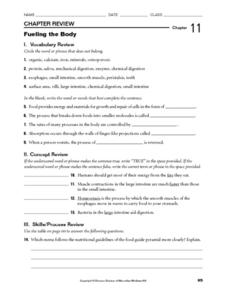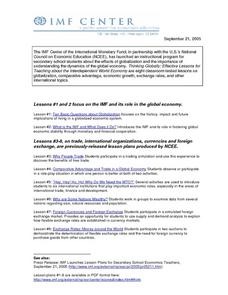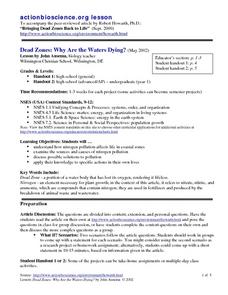Curated OER
Lattimer Massacre: What's Beneath the Surface?
Middle schoolers research the growth of unions due to issues related to the Lattimer Massacre. They research primary source documents and create posters, skits and role plays.
Curated OER
Beyond the Story: A Dickens of a Party
Seventh graders collaboratively research the life and times of Charles Dickens as it relates to a character from the story, and write and present a first-person character analysis.
Curated OER
Going on a Bear Hunt
Pupils discover the value of Internet safety. Through various traditional and multimedia presentations and stories, students explore the ways in which they can gather information on the Internet with an emphasis on safe searching and...
Curated OER
Solid Waste and Our Natural Resources: Utilizing the Story THE LORAX
Students gain an introduction to our planet's solid waste problem and our personal responsibility in curbing and solving said problem through the use of Dr. Seuss' book, The Lorax. After hearing the book, class discussion follows.
Curated OER
Fueling the Body
For this nutrition worksheet, students review the organs and enzymes that are part of the digestive system. Then students review the food pyramid by comparing two menus. This worksheet has 9 fill in the blank, 4 true or false, and 5...
Curated OER
Your Land is My Land: A Look at Bootleg Coal Mining During the Depression
Students examine the extreme conditions of unemployment during the Great Depression. In this multiple perspectives lesson, students analyze photographs of coal mining, research and adopt the perspective of a person affected by...
Curated OER
Boys and Puberty
Students describe the internal and external changes boys experience during puberty. Through lecture, students are introduced to changes that faced once the reach puberty. A discussion of personal experience follows the lecture.
Curated OER
Lettuce Us Be Different
Students evaluate their differences, then look at differences in plants. In this class team building and life science lesson plan, the class play a game that focuses on similarities and differences in the group, then students plant three...
Curated OER
Hey, Hey! Ho, Ho! Why Do We Need the WTO?
Students participate in various hand-on activities as they study six international institutions that play important economic roles in the areas of international trade and finance.
Curated OER
Determining the Effectiveness of Handwashing
Students participate in an experiment in which they grow bacterial colonies. They examine the effects of antibiotics killing the germs. They discuss their findings to end the lesson.
Curated OER
Endangered Spaces = Endangered Species!
Sixth graders discuss the crowding, loss of personal space, loss of home, loss of food, etc. that might occur at a developmental site. They witness, through an in-class demonstration, what happens when land is taken for development. They...
Curated OER
Anatomy Grade Level: First Grade - FIVE SENSES
First graders name the five senses, identify major body structures and organs and describe their basic functions. In this anatomy lesson, 1st graders learn about the basic structures and functions of the human body and how they relate to...
Curated OER
Brine Shrimp
Students gain a sense of the delicacy and complexity of a living organism and the rather narrow range of conditions under which it can live.
Curated OER
International Monetary Fund
Twelfth graders examine the role of the International Monetary Fund. They participate in activities to discover the funtion of the organization. They also focus on fair trade and cooperation between its members.
Curated OER
International Monetary Fund
Twelfth graders discover the role of the International Monetary Fund. They use the internet to answer questions about the organization. They discuss the positive and negatives associated with the IMF.
Curated OER
Habitat Unit - Day 2
Students explore abiotic factors that affect habitats. After a class lecture, students work in groups to answer questions about plant tissue, production and growth. They share answers, complete a crossword puzzle, and create a habitat...
Curated OER
Radio Program #11-The Family Farm
Students interpret the lives of persons who grew up on family farms. They compare the changes in farming technology from early days to present time. Students project what the future holds for family farms.
Curated OER
Life in Britain during the Industrial Revolution
Students comprehend the living conditions, experiences and opinions of the people who lived during the Industrial Revolution. They examine primary source documents relevant to the topic. Students compose a letter representing the living...
Curated OER
Plant Biology
Young biologists discuss the reasons behind the current use of the plant identification system. They get into groups and identify the characteristics of each species of plant which is described. The keys needed for groups to make...
Curated OER
High Performance in Agriculture Science: Graduates Outperform Others
Students plan for their future by exploring occupational experience programs.In this career lesson plan students list activities that they will participate in in the future and complete a career exploration project.
Curated OER
Leaders in the Anza Expedition
Students conduct Internet research on historical characters in the Anza expeditions. They compare/contrast the Anza leaders and analyze their relationships to each other in the Anza expedition.
Curated OER
Designing a Real Life Ecosystem!
Students research abiotic and biotic factors concerning the concept of an ecosystem. Record and analyze data collected. Write a lab report in proper and scientific format with thinking and analytical skills. Work as a cooperative team.
HealthTeacher
Get More Sleep
Help learners identify habits that interfere with sleep and to understand the importance of adequate rest and its impact on not only physical health, but also emotional wellbeing.
Curated OER
Dead Zones: Why Are the Waters Dying?
Students investigate the effects of pollution on marine ecosystems. They read and discuss an article, identify the effects of pollution on marine life, conduct research on local nutrient pollution, and conduct local water quality studies.

























